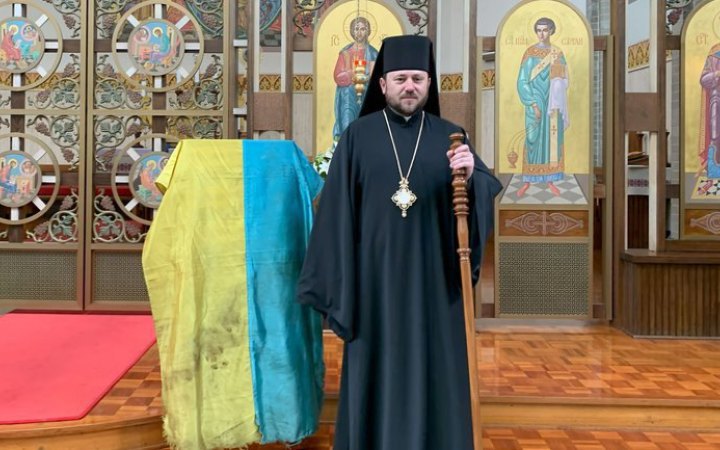‘A huge cross is placed on the shoulders of the new Pope’
The main question is: how was the Pope elected, how did the conclave go? I am aware that I cannot say too much, because it is a secret of non-disclosure. But tell us in general terms, for secular people who are always interested in the backstage, what were your impressions?
Six months ago, I could not imagine that I would participate in such events of the Ecumenical Church. Because, as you know, on 6 October, the late Pope Francis proclaimed me a cardinal, which was a complete shock and such a surprise for me. The whole world knew that I had been declared a cardinal, but I did not.
At the time, my phone was on silent because I was visiting our parish in Brisbane, in eastern Australia. It was already evening and we were having dinner. When I switched on my phone, there were so many different messages, greetings, missed calls. At first, I was in a kind of frozen state because I could not believe that something like this had happened. But later, when I opened the Vatican's official website, I saw that this was not a joke. That is why all these events developed very quickly for me. And, in particular, later, on 7-8 December, when the official consistory, that is, the official induction of the newly appointed cardinals into the college, took place in Rome, in St Peter's Basilica. And no one imagined that something like this could happen.
You probably recall that His Holiness Francis was in hospital in February and again in March. Many people hoped that this would be the end of him. However, he returned to health as much as he could. And no one expected that this would happen on the second day of the Easter holidays, because on Easter, although it was difficult for him to speak, he spoke to the people of God and blessed them. And on the second day he departed. This news caught me on the plane. I had just taken off from Melbourne, flying to the Holy Land. And then I turned on the television and heard that the Holy Father had died. Indeed, this news took me by surprise. Like, in fact, many people who did not expect that the Holy Father would pass away at this very moment.
Back to the conclave. These are feelings that cannot be described, because this is something incredible that is happening in the Church of Christ. And this event is not like the election of presidents, prime ministers, etc. We have to understand that here the Lord God Himself is looking for the person who will accept this responsible ministry of shepherd of the church of Christ to the whole world.
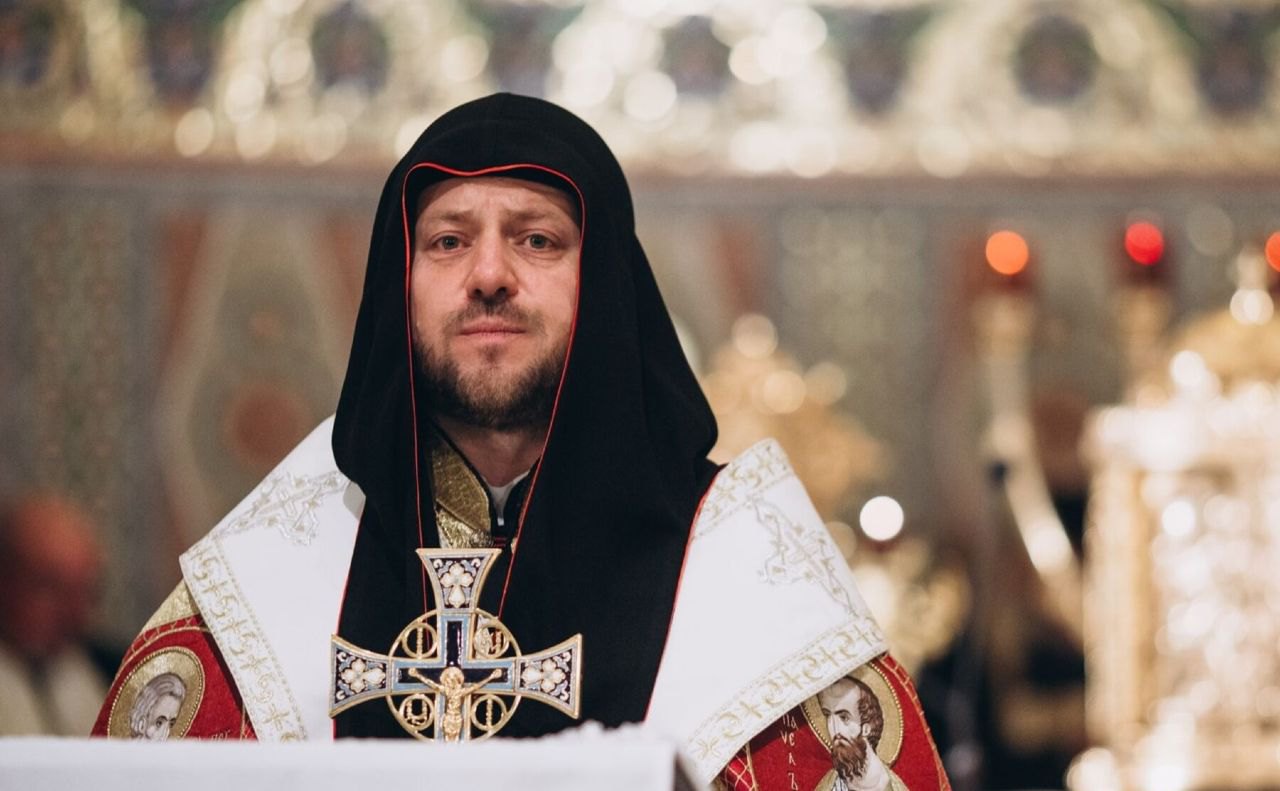
The second time I felt it was when the election of the Holy Father had already taken place, and when we were all waiting to go out on the balcony. And when we went out and announced that we had elected a new Holy Father, it was something incredible. When you stand there, from the balcony, you see hundreds of thousands of people gathered to hear this good news: many cameras, journalists, people everywhere. This view from the balcony of St Peter's Basilica was just incredible. It is impossible to convey these emotions. I think many people were expecting (to elect - Ed.) a different person, but this conclave showed that the Lord still chooses. People think about it, make some predictions about who it might be. But they chose the person no one expected, not even the cardinals themselves. And this is what came as such a big shock to many people when the white smoke went up. I even know that some priests who live here heard about it and just ran to be in time for the moment when the new Holy Father would come out.
But these emotions will calm down over time, and the newly elected Holy Father will have to take responsibility for the Church of Christ. Indeed, I would say that he has a huge cross on his shoulders. It is to make this cross easier for him that cardinals from all over the world are here. We had this opportunity to gather for seven days, to listen to various reports from different continents. And I have to say that the topic of Ukraine, peace, and ending the war was really the leading one. And I think that this will be such a leading thread in the pontificate of the new Holy Father. Because in his first speech to the people of God he said: ‘Peace be with you.’ He said that this peace does not come only from the powerful. True peace comes from God, who truly fills not only the peace around us, but also within us, in our hearts.
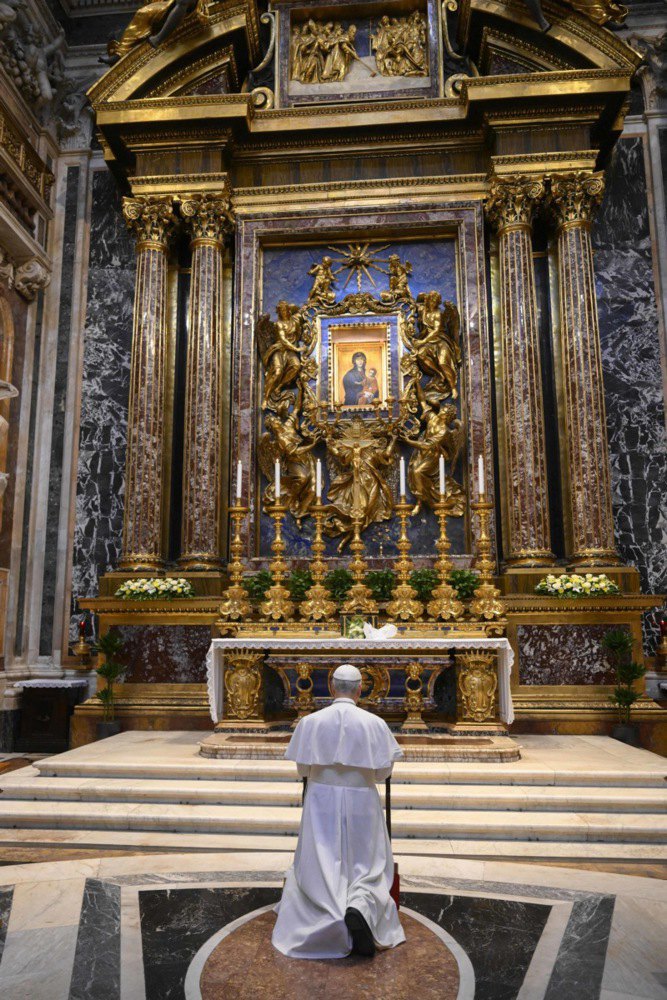
‘The process of electing a new pope is not like the Hollywood film Conclave’
We will definitely talk about peace and the new pope's policy towards Ukraine. Let's clarify a bit about the conclave. Did I understand correctly that he was elected in the fourth vote? And when the first two times there was black smoke, it became clear that the favourites had not been chosen. Then all of you in the Sistine Chapel realised that it might take longer, because there was a process of hesitation?
It's hard for me to say because it was the first time I had such an experience. I think it would be much more interesting to listen to those cardinals who have attended the conclave for the second or third time. Indeed, they have this experience and can compare.
But I, as a young cardinal, saw a great sign of the Holy Spirit's action. Yes, there were different expectations, different forecasts, but it showed once again that the Holy Spirit is involved in a special way. And that is why it came as such a shock to everyone. Because everyone was expecting the names that were circulating, let's say, in various media spheres, social networks. If I'm not mistaken, Cardinal Prevost's name was not on any such lists. And this really came as a surprise. Again, we, as people of faith, understand that the Holy Spirit chooses, not people.
From a secular point of view, if we try to interpret this choice of cardinals, we can note that each favourite had some strengths and weaknesses, some active position, with which some agreed, some disagreed. And perhaps the cardinals were guided by the fact that they needed a neutral figure who would be neither for the right nor for the left, neither for the red nor for the white. Can this be said of Pope Leo XIV today?
One thing we can say is that we had the opportunity to listen to different opinions from all over the world for seven days. And I think it also became a kind of inspiration for many cardinals, seeing the good sides of the Church, seeing perhaps some challenges from the past that were not dealt with. And that is why this particular vote turned out the way it did. There is no explanation, because it is impossible to make an explanation when the Holy Spirit is so involved. And yes, as I said, the cardinals did not even expect this. However, I think that after this surprise come the challenges and realities of life, which will have to be answered.
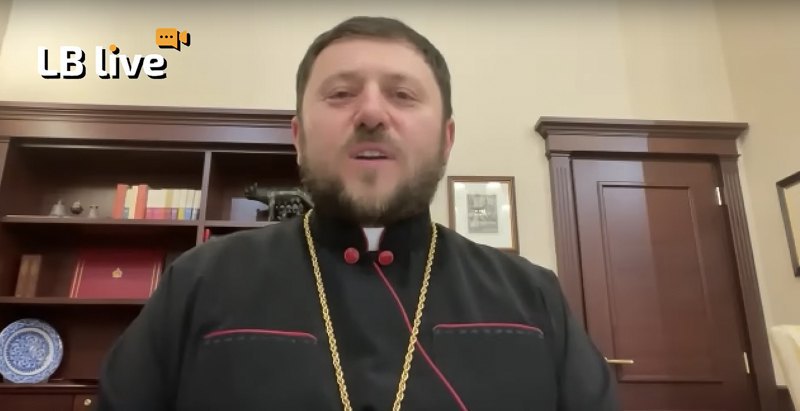
Well, it is clear that when he was nominated, he understood that it could be either way. But how he reacted to the white smoke - first of all, he accepted it in silence and deep humility, but he prayed. You could see how he contemplated this Last Judgement, how he closed his eyes, how he prayed. That is, it is a really good signal when a person realises that just a few seconds ago you were an ordinary cardinal, and now you have a completely different mission: to be responsible for the whole Church of Christ. Of course, it will be very difficult to rely on your human strength. Here you need to ask the Lord God to somehow lead the church of Christ through you. Because just as the Lord guided our hands and thoughts in choosing the successor to the Apostle Peter, so He should guide him in his ministry.
And to conclude the topic of the conclave, perhaps from the church's point of view, it is even a primitive question. But it is of great interest to everyone: is the atmosphere in the Sistine Chapel really similar to the one we saw in the film The Conclave?
The film The Conclave did not fully reveal everything that happens during the election of a new pope. The first mistake of the film is that it did not show a single moment when the bishops pray. And this is the most important thing. Practically the first mission at the conclave is the prayer of the cardinals. Because you have written the vote, then it takes a long time for the votes to be counted and the results announced. That's why we, as cardinals, prayed a lot. I understand that Hollywood had to make this film the way they saw it, but the reality is completely different.
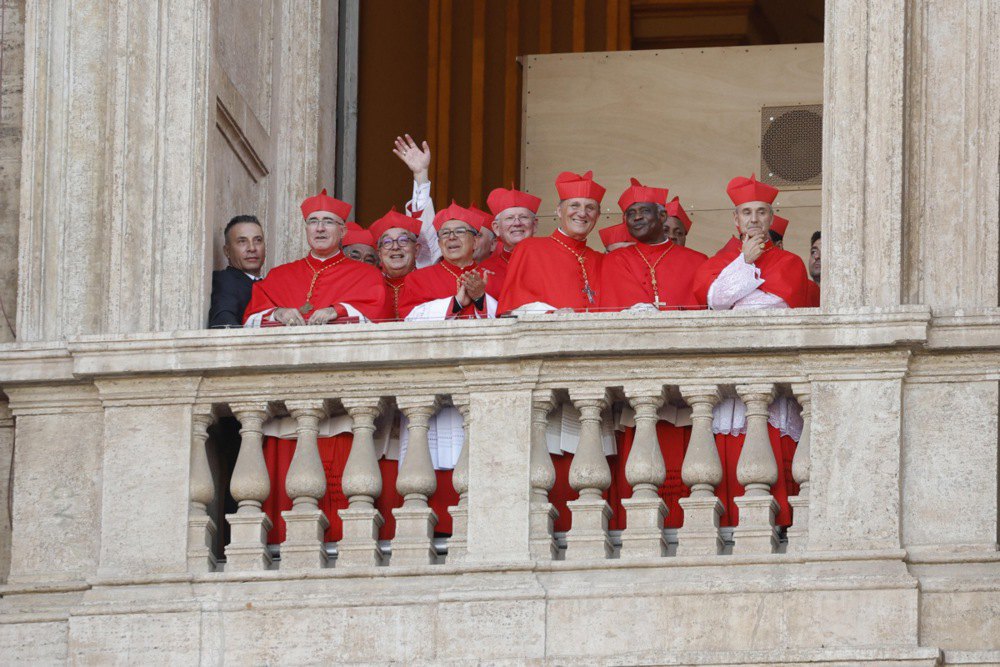
‘It is important for Ukrainians that the pontiff does not stand aside from the war and has a clear position on who is the aggressor and who is the victim.’
When it became clear that this is the first American-born pope, many observers started talking: yes, he will definitely act in unison with Trump, his policy will be Trump's policy. How do you explain to these people that the Vatican is not only about religion, but also about geopolitics? Often the word of the Pope is more weighty, especially in critical moments, than the word of a secular leader. A secular leader is elected for 4-5 years, while the Pope, unless he refuses, is elected for life.
Despite the fact that the new Pope was born in Chicago, he spent a significant part of his life outside of Chicago and outside of America. And this is his strong point. He went on a mission to Peru. As you know, he belongs to the Augustinian order. And from what I've heard, he even renounced his American citizenship and took Peruvian citizenship in order to devote himself entirely to serving the people to whom he was sent. First as a missionary, then as a bishop. And this is a very good side of him, because he knows people's problems, not from books or offices, but from real life.
Yes, we can say that for the last three years he has been in a completely different reality. However, I want to point out that the Dicastery for Bishops is one of the most important dicasteries that names new bishops around the world. And a lot depends on it, because a bishop is a person whom every priest, monk, and nun looks up to. He is the one who should bear witness to the living Christ, who should be an example to follow. Yes, a lot of people will want to manipulate this topic, but the Pope understands the responsibility he has. And, in particular, his first speech clearly gave certain directions on what he will pay attention to. It gives us, Ukrainians, some hope, because we have been suffering from a full-scale invasion for three years now and the eleventh year since the occupation of Crimea and Luhansk and Donetsk regions.
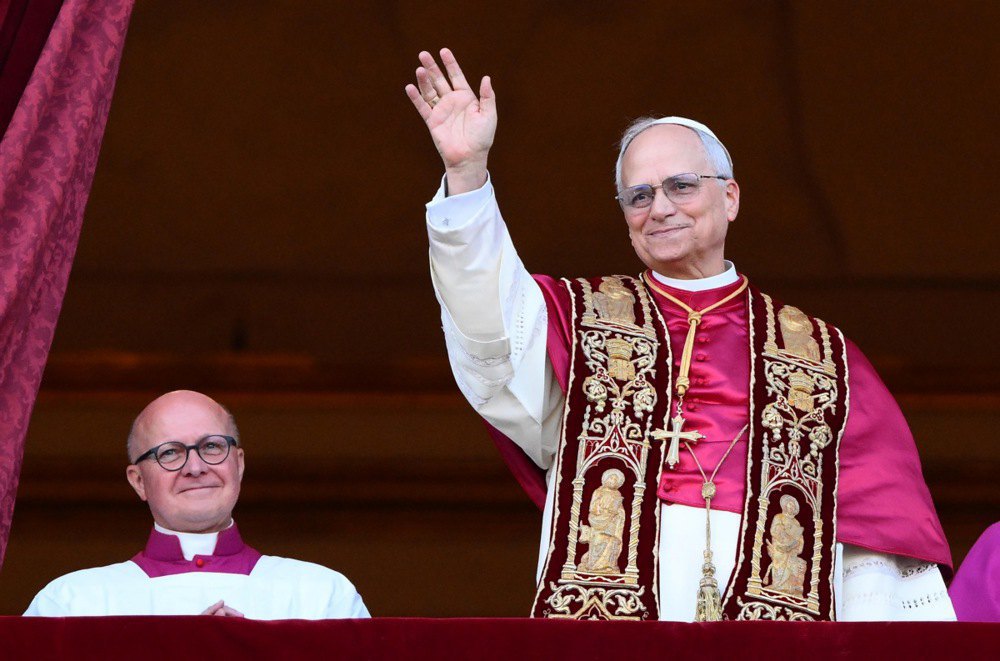
It is clear that Trump will now try to sell domestic voters that the Pope is his victory. And here we can recall how it happened in Ukraine in 2019. When Petro Poroshenko was running for office, he adopted the slogan ‘Army. Language. Faith’. And even his images with His Beatitude Epiphanius were on billboards. I know that His Beatitude did not like it very much, but it happened. This situation is a mirror image for me. But the Pope will be able to cope with it, I think.
It is mirrored, but as I said: he still has something that people do not understand yet and that will manifest itself in the future. Yes, he's a bit of a mystery, he's silent. I just met with a priest who knows him very well. And he shared a certain insight about the Pope: despite the fact that the Pope received all these titles, he always tried to return to their monastery, always tried to be in contact with them, not to distance himself. He was always interested in their life, in their challenges. And this is very good. What does it mean? That he will have the same attitude in his new place of service. I think the next few weeks will really define his mission.
And what he said will become a reality, where we will see certain steps. In particular, for us, Ukrainians, it is important that he does not stand aside and has a clear position: who is the aggressor and who is the victim of war. And that he will really take this pro-Ukrainian line, try not only to end the war, but also to be an apostle for ending the war. And that it would be a just peace, where the occupier would be condemned and where we, as victims of war, would be truly justified. Because now, with the election of a new American president, it's all somehow mixed up. And this really hurts us, Ukrainians, and many people who really understand what is happening.
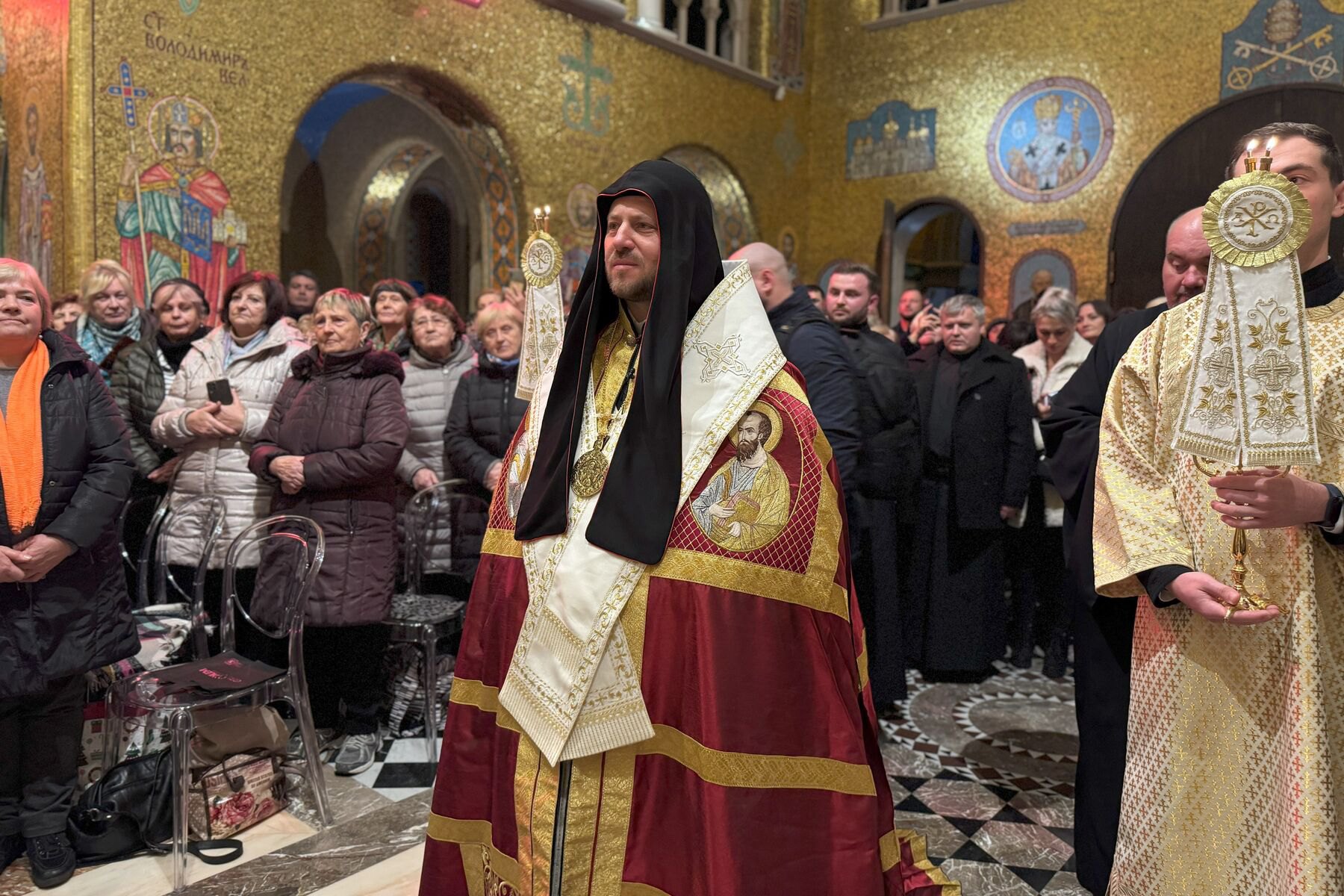
‘When the Vatican takes certain actions, it does not publicise them’
We will talk about this in detail. I would like us to draw another parallel with Ukraine. And I would like you to debunk this parallel. Because, again, in 2014, when, after the death of the former head of the UOC (MP), His Beatitude Volodymyr Sabodan, a neutral figure, as it seemed at the time, Metropolitan Onufriy Berezovskyy was elected, everyone said that he was a man of the church, a prayerful man, not a politician, unlike the pro-Russian Antoniy Pakanych, who had high chances of leading the church at that time, and it was good that Onufriy led it... But then we saw how it ended. Won't it be the case with this pope that, because of his isolation and prayerfulness, he will avoid, perhaps, some political aspects of his activities or will shift it? This parallel worries me a little bit.
Again, you see, we are entering the same problem of predictions. That is, some predictions (about the election of a new Pope) did not come true. And so we are now somehow adjusting ourselves again to something that has not yet happened. Now we need to give the Holy Father the opportunity to fully enter his role, and only then can we make any assessments. I mean, I'm not ready to make any predictions right now.
Yes, I understand, and I am completely with the Ukrainians that our desires should become not only realities, but they should come from the mouth of the Holy Father. However, you know, even going back to the previous pontiff, I understand the pain of Ukrainians, and I was also very hurt by certain statements. However, in general, Pope Francis was a pro-Ukrainian Pope. And, as I have said many times, history will dot the i's and cross the t's. And a lot of things that may have been implicit will become explicit. You know, when the Vatican does something, it does not advertise it like everyone else. It is done in secret. God knows, maybe someone else knows, but everything is done in secret. And in this area of communication, we want to put everything out in the open. However, certain things become apparent over time. Therefore, I am not ready to make any definite assessments about the new pontiff.
Yesterday I had the opportunity to talk to him for half a minute, when, after the election of the Pope, each of the 133 cardinals could come up and say something. So I first said where I was from, that I was a bishop for Ukrainians in Australia, New Zealand, and Oceania. That I promised him my prayers, the prayers of the Ukrainian and Australian people, and, on the other hand, I was waiting for his prayers for an end to the war and a just peace, for him to truly be an apostle of peace, for him to have this clarity about this war and to support us as victims of this aggression. It was a few seconds, but they were really important for me. And later I heard his speech about peace - it was a very good sign for me that the beginnings are good. We won't predict what will happen next, but the beginning is really very good.
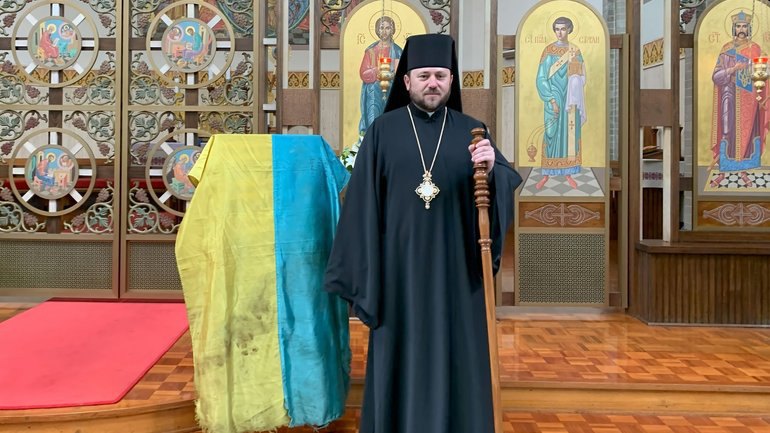
The question here, of course, is what each person means by the word peace. For every leader, the factor of his environment and his team is important. What can we say today about the new Pope's environment and possible team? Who will be by his side? To what extent are these people pro-Ukrainian, pro-Russian, pro-American? If you can share something from your own observations, please do so.
Unfortunately, I can't share anything because it's only been a day since we elected the pontiff. We are all still not fully aware of what has happened. And I think he is also still aware of what has happened. And he is probably having a lot of different conversations, discussions, inquiries, meetings.
And perhaps the meeting we will have tomorrow will clarify something a little bit. He is specially gathering all the cardinals, not only those who elected the pope, but also those who are over the age of 80, to perhaps listen to some advice. Perhaps he wants to share something with us. Indeed, it is difficult to say anything now.
‘The powers that be will try to enlist and manipulate the support of the Holy Father’
And to move on to the issue of Ukraine, let's finish with America. You served there, and you know the mood there, you know the situation from the inside. You are aware that there is now a confrontation between liberals and conservatives in the church. And if we talk about the new times that have come with the re-election of President Donald Trump for a second term, these MAGA ideas, they promote this kind of religious fundamentalism. And yesterday, when we were talking to Father Kyrylo Hovorun, he used a term that really struck me as very disturbing - ‘political Catholics’. We were talking about J.D. Vance. And why did it cut me so deeply? Because it reminds me of political Orthodoxy. What threats, what challenges do you see for the new pope in terms of this optics that I have just outlined? And what are the threats to the Catholic Church in the United States from a political point of view?
Of course, I cannot be fully involved in the current situation in America, since I have not served there for the past five years, and the situation has changed dramatically over the past five years. However, I want to point out that America has been and is a country of faith. Yes, it is not entirely Catholic, but a significant part of Americans are Catholics.
What you said is true: not everyone who calls on the Lord goes to the Kingdom of Heaven.
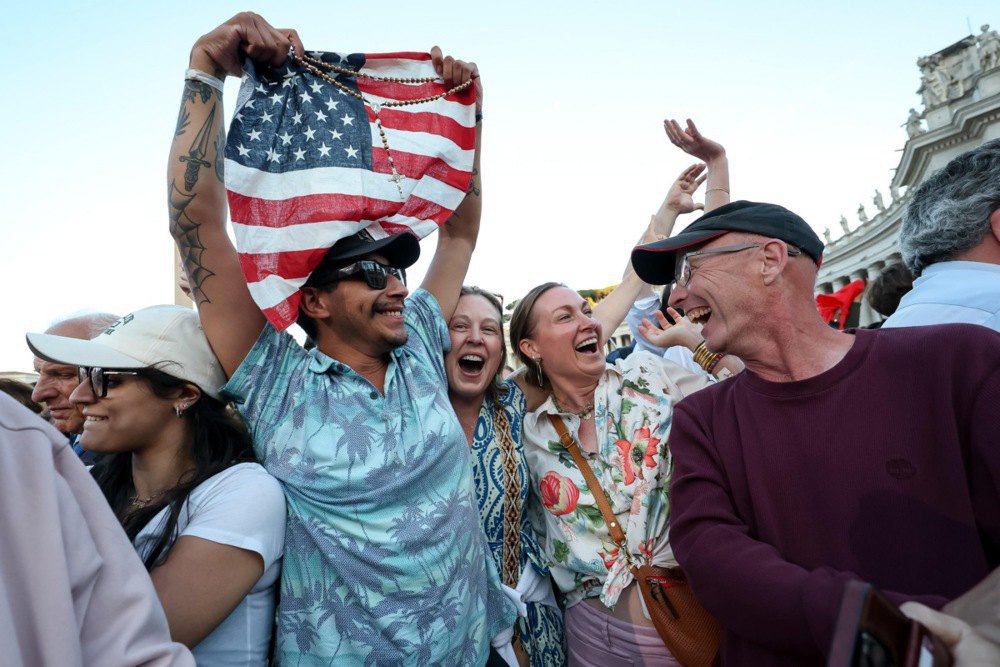
And I think the current political mood in the US has an impact not only on Americans, but also on the whole world. Despite the fact that they talk about great ideals, the reality is quite different. What does the president say in Russia? He also talks about great ideals, Christian values, and where does it end? So, indeed, the challenges will be enormous. Because, as always, the powers that be will try to enlist the support of the Holy Father, will try to manipulate him to some extent.
However, I believe that he will be steadfast and will not choose a certain line of politics, but will be guided by God's Spirit and God's Scripture. Sometimes it will be necessary to say things that will be difficult for politicians to hear. That is, the truth, no matter how uncomfortable it may be for someone.
But we have to hope for the best. We are now living in a year of jubilee, a year of hope, to see the light at the end of the tunnel. We have to live in reality. We cannot live only in virtuality, but we still need to have this hope not only in the powers that be, but also to understand that the Lord God is above all.
In particular, we in Ukraine have been experiencing this for the past three years - that God is with us because we are standing and fighting. Yes, we pray that this terrible war will end and that this long-awaited peace will come.
On the topic of sustainable peace. Again, we have already realised that the meaning of this word can be understood in different ways. And you mentioned the predecessor, the Pope. In the first year of the great invasion, it was a very outrageous situation for everyone when a Ukrainian and a Russian woman took part in a religious procession. But for him, it was an absolutely sincere gesture and really an attempt to somehow establish contacts. We know the pro-Russian cardinals and their sentiments. Perhaps you have singled out someone who is very pro-Ukrainian? Cardinals who are in favour of us? Are there any names of cardinals who could inform the new pope about Ukraine, about a sustainable and just peace?
You know, for reasons of confidentiality, I will not do this. I could say it, but it would be harmful. These things like silence.
But do they exist?
But they do exist and there are a lot of them. I also want to note that journalists missed an event that happened a few days ago. At the last meeting of the cardinals, and there were 183 of them, almost all of them signed an appeal to the powers that be - that is, to all presidents and prime ministers who have any influence - to end the war in Ukraine. Yes, the Middle East was also mentioned, but Ukraine was the most prominent. And somehow the journalists missed that. We Ukrainians have this habit: when something is bad, we immediately put it out in the open, we immediately show it.
But let's be fair. Are we looking for a just peace? Yes, we are. If there is something good, and this is 183 cardinals, this is the whole world. And here this topic was not covered at all. I have not seen it anywhere outside the Vatican media. And this really hurt me as well.
That is, we must also be so adequate in assessing the situation-not only when there are some bad statements, but also when there are good ones.
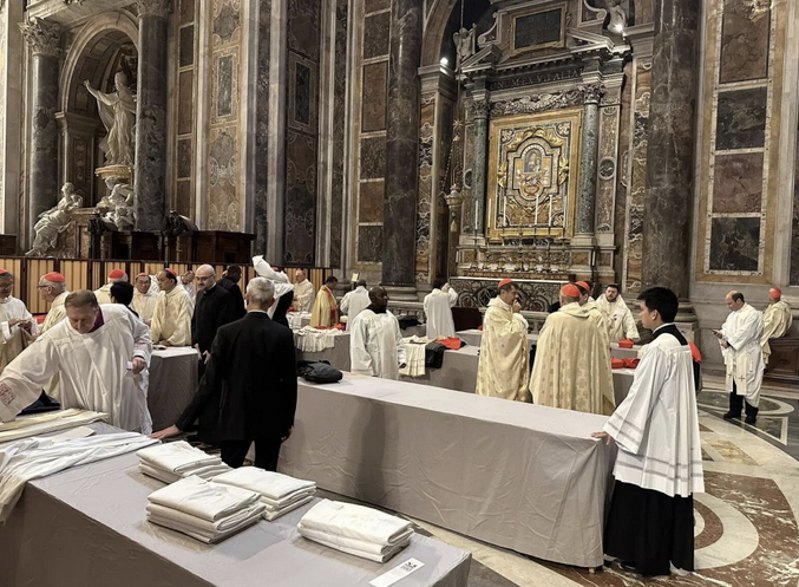
Indeed, although I follow religious issues myself, I did not see this either. Who initiated the fact of this appeal by 183 cardinals?
We, the cardinals, initiated it when our meeting was already over. After the meeting of Presidents Trump and Zelenskyy in St Peter's Basilica, there was such a desire of the cardinals to appeal to the powerful. I was very curious whether it would be successful or not. And, indeed, it not only ended successfully, but also went through a certain revision so that this text was the way it was published.
Did Gugerotti sign it?
It was voted for by all the cardinals. So I think he signed it.
This is very good news, of course. It's just that it looks somehow too encouraging against the background of the Vatican's position on wars in the world after the First World War. It was a demonstrative, in a good sense, position of neutrality. And this was explained by the fact that this neutrality allowed it to participate in the exchange of prisoners, hostages, and in some humanitarian missions. But we remember the world's reaction to the events of the Second World War. When it became clear that fascism was coming to an end, only then did the Holy See outline its position. Before that, it was neutrality. And so this may partly explain what is happening now with regard to Ukraine.
Yes and no. You know, I wouldn't want to live in the past. Yes, we need to look at it in order to change something sometimes, to change the mistakes of the past, so as not to repeat them in the present. Still, I would evaluate the present, or perhaps this last pontificate, as much as possible. And I would like to point out that, despite a few statements that were really negative, the Pope was pro-Ukrainian.
Look, the last Easter service. There is a very beautiful tradition that the word is read in different languages. And the first language literally less than a month ago, on 20 April, in St Peter's Basilica was Russian. Well, it could have been any language: Latin, Italian, English, etc. We understand that the service is being prepared. The Pope could not have been unaware, even if he was very ill, of the procedure for preparing the Easter service. It couldn't have just happened, it couldn't have come as a surprise to the Pope that the first word was read in Russian. I'm sorry, this is definitely not the pro-Ukrainian story of the previous pontificate.
I agree with you, but also understand the state of the Pope. Indeed, it was a problem, but we hope for the best and hope that the new pontiff will have a clearer position that will not hurt us.
Why did I ask about the environment? Again, I understand that the Pope did not write the script himself, but he definitely proofread it.
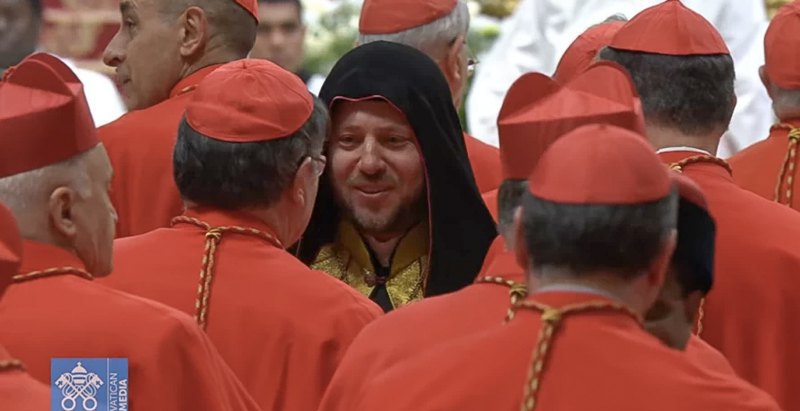
‘Many cardinals are disappointed in the Russian Orthodox Church - now the support of the Russian Church is minimal’
You have already said that all the powers that be will be looking for the support of the new pontiff. And in this context, I cannot help but ask you what you think the new pope's policy towards the Russian Orthodox Church will be. I want you to give me not your forecast, but your vision, based on the current situation in the Catholic world as a whole. How do you understand it, how do you analyse it?
We know that His Beatitude Bartholomew, the head of the Patriarchate of Constantinople, actually directly calls Kirill (the head of the Russian Orthodox Church - Ed.) a heretic. And in the church vocabulary, there is nothing worse than being a heretic. And this is a legal definition. That is, he does not speak directly, but he speaks of heresy. Here is a verbatim quote from His Beatitude Bartholomew's speech in the Parliament of the Republic of Lithuania in March 2023: the Russian authorities use the church as a tool to achieve their strategic goals, and the Russian church fully shares responsibility for the bloody war in Ukraine.
In your opinion, is there an awareness in the modern Vatican that the Russian Orthodox Church does share responsibility with the secular Russian authorities for the bloody war in Ukraine, and, given this, how will new relations be built?
There are many cardinals who clearly understand what the ROC is. In particular, what happened after the full-scale invasion, when Patriarch Kirill blessed the war rather than praying for peace. For many cardinals, this was a litmus test, and for many it was a disappointment. Yes, there were a lot of sympathisers, and there are probably still some today. But for many, it showed that you really cannot serve both God and the president. Then the question is: who do you serve more? The Russian Orthodox Church does not have the support it once had...
Yes, there are, perhaps, some other currents that are trying to see that ‘great spirit’ in Russia. Many cardinals (believe - Ed.), and I shared with them, that ecumenism (mutual understanding between Christians of different denominations - Ed.) should be not only with the ROC, but with all churches. But, unfortunately, for some reason, this was the policy: if there is communication with the Russian Orthodox Church, this is already a higher level of ecumenism. Which was a mistake. I think many cardinals saw this truth about the Russian Orthodox Church and were disappointed. And this support that exists today is actually very minimal compared to what it was 3-5 years ago.
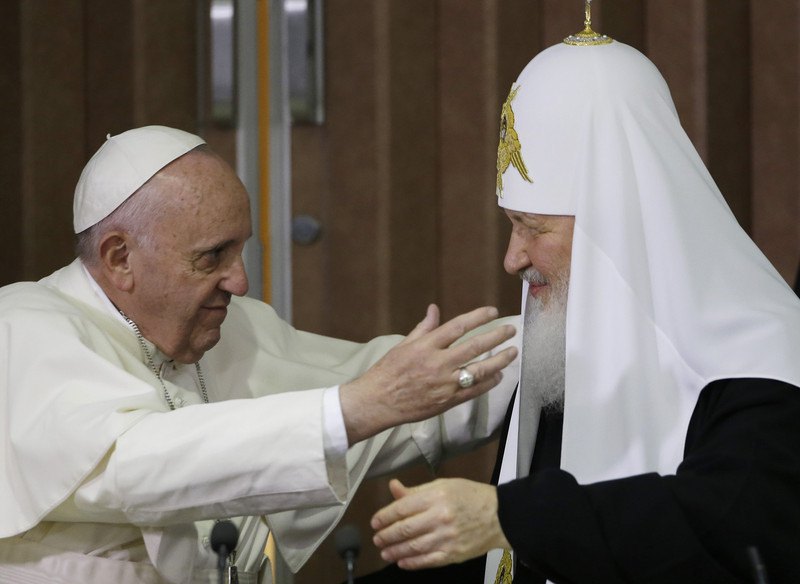
Even so: 9 years ago, in 2016, the then Pope and Gundyaev met in Havana, the so-called Havana Declaration. And this was the first time in history that the Pope ever met with Patriarch Kirill. It is clear why Patriarch Kirill needed to do this, although he later took a lot of heat from his far-right. But it was a political task.
What the Pope got out of it is not clear at all. But we know that, despite everything, the Roman Catholic Church wants to expand to the east. And this is a normal aspiration. It is unlikely that the new Pope will completely break with Moscow. But we need to somehow build relations with Moscow, understanding what is happening. How to do this?
This must be done without putting someone above others. Because then this ecumenism is not a true communion with the churches.
And about this Havana Declaration. This may have been the first stumbling block. Then our blessed patriarch Svyatoslav had to speak out very clearly and say that when they talk about us, but without us, it is not very good. And this was the first such conflict, so to speak, where we had to declare that we, the Ukrainian Greek Catholic Church, also have a position of our own. Instead, unfortunately, what happened happened.
‘Preaching the word of God in the era of technological progress is a challenge facing the Holy Father’
What, in your opinion, are the chances for the UGCC to receive a full-fledged patriarchate with the new pope?
It is difficult to say, because I am not a prophet, I cannot see the future. Our desire for patriarchy has always been there. But it was most clearly voiced after Patriarch Josyf Slipyj was released from the Siberian concentration camps. He did everything to ensure that this status was proclaimed by the Vatican.
What is a patriarch? It's basically a recognition that you are the head and father of the church. So there seems to be nothing complicated here, but, as always, there are certain manipulations, political and ecclesiastical influences - we know where they come from. And that's why we are making all those efforts and even expanding our structures in Ukraine. You can see this over the last 11-15 years, when everything was done to have these structures developed not only in Ukraine but also around the world. You know, we are practically a church, with our structures in every corner of the world.
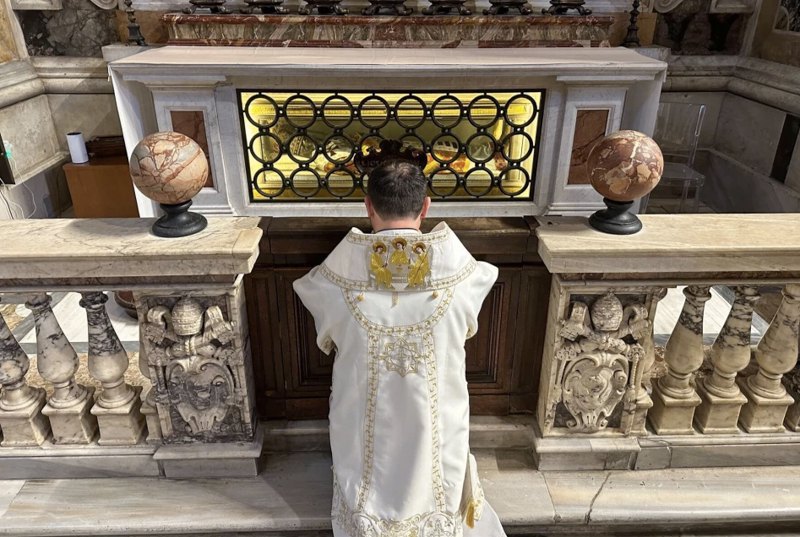
In fact, you are a patriarchate. You just don't call yourself one and are waiting for the Vatican to recognise you as a patriarchate.
You mentioned political influences on this process. And here I want to clarify: in the 60s of the twentieth century, Josyf Slipyj initiated the question of the patriarchate. And then, in fact, a decision was made to grant the status of the Supreme Archdiocese, which is actually equal in authority, but still not called a patriarchate.
But back then, in the 1960s, there was a rapprochement with the Russian church. And politically, to grant the UGCC patriarchate then would have meant a very strong quarrel with Moscow. Now there is no such fuse, but, on the other hand, there is no precedent for the Uniate Church to be granted patriarchal status.
In those days, it was really very difficult for Patriarch Josyf Slipyj (we call him patriarch because he is the head and father), it was difficult from different sides, and even from within the church itself he did not have such a great deal of support. Today, I want to tell you that this support of His Beatitude Patriarch Svyatoslav is almost complete. Today we have about 50 active bishops of the UGCC around the world who really support him fully in terms of the patriarchate. We have a lot of different people who, since the time of Patriarch Josyf Slipyj, have created the so-called patriarchal movement. That is, a lot is being done, but not everything is being announced... Indeed, we hope that the new pope will be able to fulfil our wish that our patriarchate be recognised by the Ecumenical Church. So we will continue to work on this and hope that it will become a reality during this pontificate.
Why has His Beatitude Svyatoslav, despite his wide authority, not been elevated to the rank of cardinal, unlike you?
This question should be asked to Pope Francis, because I did not appoint myself. And I understand that it was not me who should have been in this place, but, in particular, Patriarch Svyatoslav or our other heads of various archdioceses. However, what happened happened. This applies not only to our church but also to many other churches...
On the other hand, I would say that the appointment of the patriarch as a cardinal would only provide an opportunity to participate in the conclave. I would not say that it would be some kind of promotion, because he is the head and father of the church around the world, not only in Ukraine.
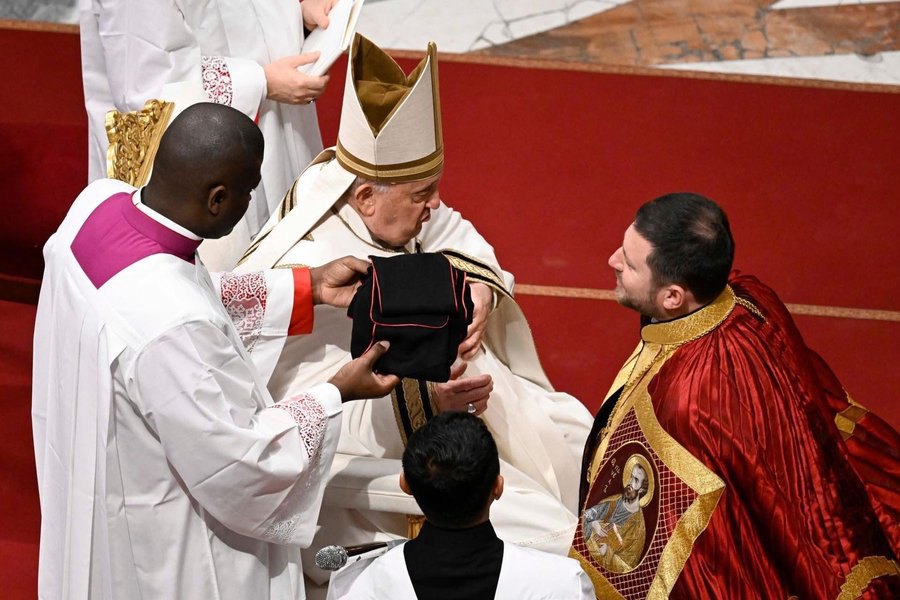
Well, it's more of a political status, to put it in secular terms. It wouldn't have much of an impact on the internal life of the church.
Finally, I have prepared a very secular question about your unusual outfit at the conclave: you were very visible on the balcony compared to the other cardinals. I would like you to tell us a little more about this. I would just like to emphasise that for Catholics of the Western rite, cardinals, the form of dress is very regulated, especially at such events. For the Eastern rite, there are no strict regulations, so, in principle, you can experiment a little bit. Including in this way drawing attention to Ukraine. When I was looking at it, it seemed to me that you had an attempt to reconstruct the vestments of the bishop of the Kyiv Metropolis from the sixteenth century. Petro Mohyla had something similar, and Kyrylo Terletskyy. Am I right?
Yes, you are absolutely right. In this procession, I was wearing the mantle of Cardinal Myroslav Ivan Lubachivskyy, which is his mantle, in which he never participated in the conclave. But this is his mantle, which is here in Rome. The Koukoulion are actually the Kyivan metropolitans. That is, I wanted to show a return to the sources, that this is not the ROC, but ours, Ukrainian.
To conclude the conversation. What if at some future personal meeting with the new Pope Leo XIV he asked you: ‘Bishop, what three main tasks would you outline for me? What global three challenges would you outline for the new Pope? Very briefly.
The theme of peace and war is the one that is most often heard and will probably be heard in the coming years. Yes, for us, Ukrainians, it is very sensitive. But wars are not only in Ukraine, they are also in other parts of the world. Sometimes no one knows or hears about them.
The second such challenge that the Holy Father will face is preaching the word of God in the era of technological progress, the entry of artificial intelligence into the game. Here, too, the church must occupy a significant niche, because the number of people who are online has grown dramatically in recent years. But it is also good to be where people are.
And the third challenge is perhaps to remember the little ones. What do I mean by that? Where there are Christians who are persecuted. We, as the Ukrainian church, in particular, went through this in the last century. And because we were together, because the Holy Father helped us, we survived. Not only because we were so strong, but because we were together, we were with the whole Catholic world.
And today, there are also many churches that are persecuted, which, perhaps, many people do not talk about. But I would like this topic to be on the Holy Father's lips as well, and for these people - the faithful, the priests who are dying for the church - to be remembered.









